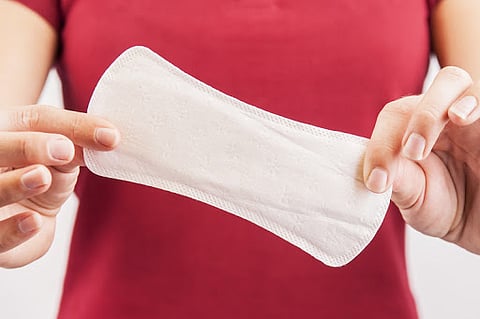Edutainment Show Inspires Adolescent Girls From Rural Bihar To Start A Sanitary Pads Bank
Taking a cue from the edutainment show Main Kuch Bhi Kar Sakti Hoon (MKBKSH), this group of young women from Nawada district of Bihar have set up a sanitary pads bank. They collect Rs 1 a day from each girl and use the money to buy sanitary pads for themselves and other girls who may not have the means to make the purchase.
The girls decided to come together to assist each other when they saw how their individual menstrual needs were often not met due to a lack of money. It’s just a one rupee- a day voluntary contribution, but this initiative is helping young girls in Nawada district of Bihar speak up about their menstrual needs and claim agency.
On International Day of the Girl Child (October 11), they share how they were inspired to act by Main Kuch Bhi Kar Sakti Hoon, which is a trans-media edutainment initiative launched by the Population Foundation of India to address issues of family planning, early marriage, unplanned or early pregnancies, domestic violence and adolescent reproductive & sexual health.
Addressing why and how the sanitary pads bank was created, Youth Leader Anu Kumari from Amawa village says, "To help someone who doesn't have money, we deposit one rupee every day. That means each girl raises Rs 30 in a month. We buy the sanitary pads and distribute it among poor girls, who cannot afford to buy them, in order to protect their menstrual health."
The creator of the show, noted film and theatre director Feroz Abbas Khan says, “When I wrote the concept for the show seven years ago, I could have never imagined the kind of impact we have seen over these years. I wanted to make a high quality show that was effectively communicating important social issues without being preachy. It makes me so happy that Main Kuch Bhi Kar Sakti Hoon has become an empowering slogan for young, adolescent girls who are now spearheading the change on the ground.”
Not just creating and sustaining a sanitary pads bank, the message of self-reliance and empowerment in Main Kuch Bhi Kar Sakti Hoon inspired these girls to also conduct dialogues about critical but so far taboo subjects like contraceptive options. As Mausam Kumari, a 17-year-old Youth Leader from Hardiya says, "Now we talk about family planning too. We visit villages and explain these subjects to women. We tell them about options like Antara injection, Chhaya, Copper T, and condoms.
The girls also came together to demand youth-friendly health clinics to be set up in existing public health centres. “Authorities hold a public dialogue twice a year and we expressed our wish of having a youth-friendly health clinic so that we can discuss our issues and talk without any fear. Our request was fulfilled and now all the girls in the village go there and use services available in the clinic," adds Mausam.
Poonam Muttreja, Executive Director of Population Foundation of India is delighted with how Main Kuch Bhi Kar Sakti Hoon has given voice to millions of young girls and women. “I am glad that the show is impacting their lives. That precisely is our goal. Through the inspiring character of Dr. Sneha Mathur, the protagonist of the series, we have initiated difficult but important conversations about sex selection, violence, gender discrimination, safe sanitation, family planning, spacing, child marriage, mental health, drug abuse, nutrition and adolescent health. That these young girls in Bihar have created a bank for sanitary pads and have also succeeded in ensuring the setting up of adolescent friendly health clinics is a matter of great pride for Population Foundation of India.”
The women watching this change unfold are recognising the shift in the conversation around menstruation. Community member Sangeeta Devi observes, "In the past, we used to suffer silently during menstruation. Our daughters told us about napkins. We also saw 'Main Bhi Kuch Kar Sakti Hoon’ and felt encouraged. I feel, all these changes were possible only because of that show."
Main Kuch Bhi Kar Sakti Hoon revolves around the inspiring journey of Dr. Sneha Mathur, a young doctor, who leaves behind her lucrative career in Mumbai and decides to work in her village. The show focuses on Dr. Sneha’s crusade to ensure quality healthcare for all. Under her leadership, village women find their voices through collective action.
Over three seasons, Main Kuch Bhi Kar Sakti Hoon has dealt with issues that few TV shows dare tackle. The first season of the show comprising of 52 episodes talked about issues like child marriage, sex selection at birth and gender discrimination. The second season of 79 episodes focused on youth and adolescents.
The third season which speaks about issues like sanitation, hygiene and family planning completed its run of 52 episodes in 2019. Season 3 of the show was produced with support from the REC Foundation and Bill & Melinda Gates Foundation (BMGF). The first 104 episodes were supported by DFID (UK’s Department for International Development), and BMGF also supported 27 episodes of Season 2.

